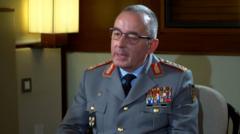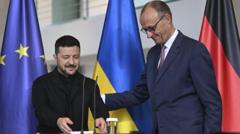As Chancellor Merz seeks to strengthen ties with the U.S., the implications of their camaraderie for international relations remain to be seen.
Chancellor Merz and President Trump: A Meeting of Minds or Policy Fortunes?

Chancellor Merz and President Trump: A Meeting of Minds or Policy Fortunes?
A look at the rapport between Germany's Chancellor Friedrich Merz and U.S. President Donald Trump in the Oval Office.
In a notable encounter, U.S. President Donald Trump welcomed German Chancellor Friedrich Merz to the Oval Office, seemingly dispelling prior notions about his relationships with foreign leaders, particularly from Germany. During a press conference, Trump asserted, “I’m not friends with anybody,” but pointed playfully to Merz, stating, “I’m friends with you.” This interaction showcased the chemistry between the two leaders in a moment of levity.
Merz, who is relatively new to his position, was quick to establish a positive rapport with Trump, effectively sidestepping the tension that often characterizes international relations under the current U.S. administration. Unlike his predecessors, Merz’s warm demeanor and business background appeared to resonate well with Trump, who has previously been critical of Germany. In a gesture of goodwill, Merz presented Trump with a significant personal gift: a copy of the birth certificate of Trump's German grandfather. Trump expressed his delight, calling it “fantastic,” and indicated it would have a prominent place in his office.
The visual contrasts during their meeting underscored their rapport; Trump, known for his blunt style, and Merz, with his composed demeanor and proficiency in English, appeared to share mutual respect. Merz stands tall and confident, embodying the qualities that have earned Trump’s favour in past meetings with other international counterparts, such as Canadian Prime Minister Mark Carney.
Both leaders addressed various issues during their discussions, although specific policy outcomes remain uncertain. Trump highlighted his appreciation for German aesthetics, quipping about the custodianship of the Oval Office. “We like fixing things up, and having them tippy top,” he remarked, drawing parallels between his administration’s approach to governance and the well-maintained reputation of German infrastructure.
As Merz navigates the intricacies of diplomacy and strives for policy advancements during his tenure, the significance of this visit could prove pivotal. Analysts will be closely observing how their burgeoning friendship influences Germany-U.S. relations, especially in the context of past tensions and current global challenges. The atmosphere of this meeting may reflect potential shifts in policy alignment between the two nations, yet the longer-term effects remain to be evaluated as Merz continues to define his diplomatic approach in an increasingly complex international landscape.
Merz, who is relatively new to his position, was quick to establish a positive rapport with Trump, effectively sidestepping the tension that often characterizes international relations under the current U.S. administration. Unlike his predecessors, Merz’s warm demeanor and business background appeared to resonate well with Trump, who has previously been critical of Germany. In a gesture of goodwill, Merz presented Trump with a significant personal gift: a copy of the birth certificate of Trump's German grandfather. Trump expressed his delight, calling it “fantastic,” and indicated it would have a prominent place in his office.
The visual contrasts during their meeting underscored their rapport; Trump, known for his blunt style, and Merz, with his composed demeanor and proficiency in English, appeared to share mutual respect. Merz stands tall and confident, embodying the qualities that have earned Trump’s favour in past meetings with other international counterparts, such as Canadian Prime Minister Mark Carney.
Both leaders addressed various issues during their discussions, although specific policy outcomes remain uncertain. Trump highlighted his appreciation for German aesthetics, quipping about the custodianship of the Oval Office. “We like fixing things up, and having them tippy top,” he remarked, drawing parallels between his administration’s approach to governance and the well-maintained reputation of German infrastructure.
As Merz navigates the intricacies of diplomacy and strives for policy advancements during his tenure, the significance of this visit could prove pivotal. Analysts will be closely observing how their burgeoning friendship influences Germany-U.S. relations, especially in the context of past tensions and current global challenges. The atmosphere of this meeting may reflect potential shifts in policy alignment between the two nations, yet the longer-term effects remain to be evaluated as Merz continues to define his diplomatic approach in an increasingly complex international landscape.





















